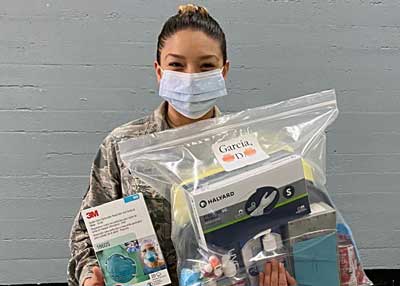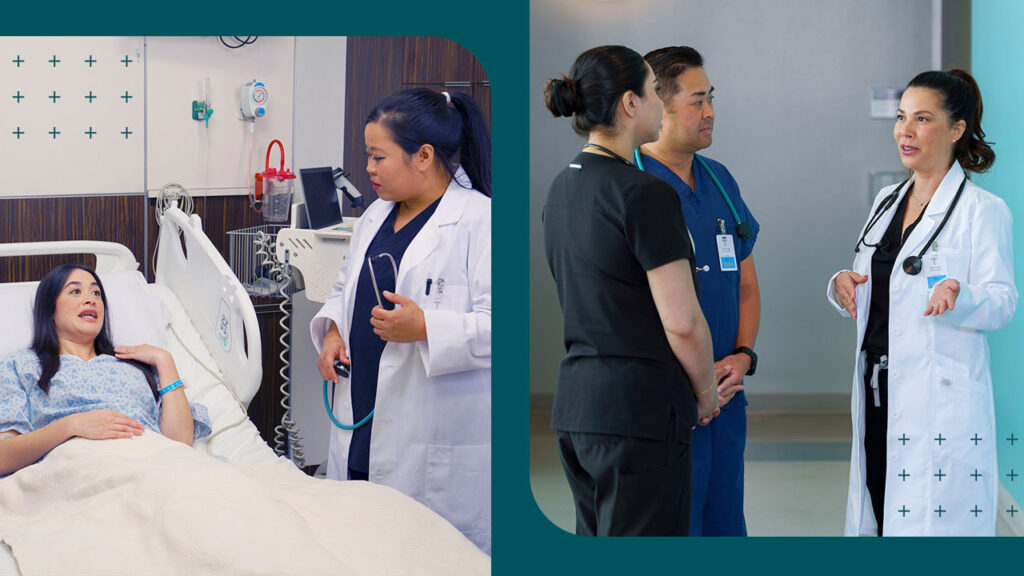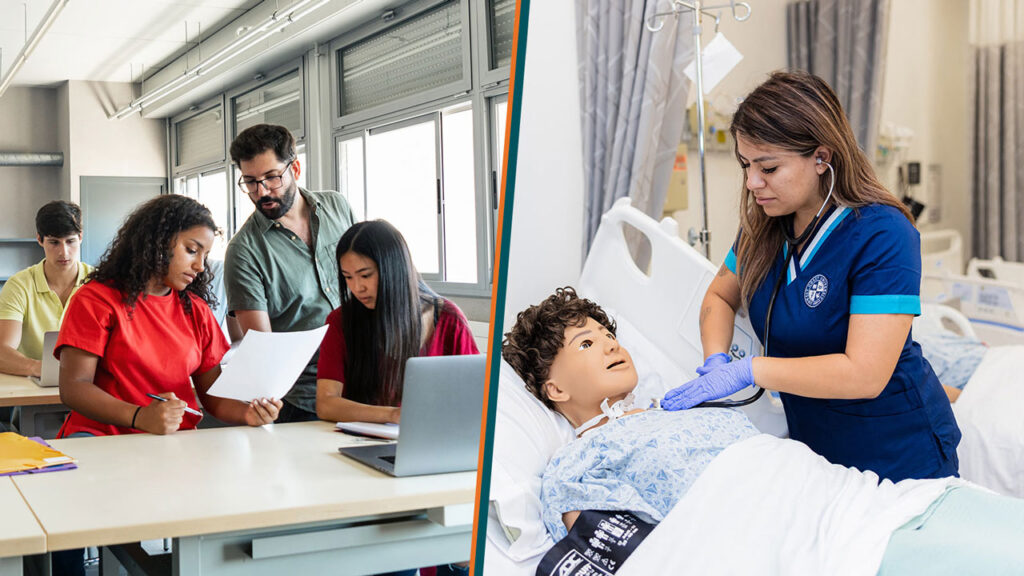Iris Rodriguez had been in the military nearly 20 years when her medical unit was activated to assist with the coronavirus pandemic in New York City.
East Coast, West Coast
Iris Rodriguez wasn’t the only West Coast University student and Air Force Reservist who was sent to New York City during the pandemic. While Rodriguez was posted at Bellevue, WCU-LA student Diana Garcia was working in Queens — when she wasn’t busy studying to pass her NCLEX exam.
Graduating early, Rodriguez needed her parents’ permission to join the US Air Force right out of high school. She was barely 18 when she headed out to boot camp and was already stationed at her first post when the Twin Towers fell on 9/11.
Rodriguez initially hoped to train in the medical field with the Air Force but instead was given an administrative role. Eventually getting to cross train as a medic, Rodriguez served multiple non-medical deployments to both Iraq and Kuwait, becoming both a licensed vocational nurse and a married mom along the way. After a few years working at the VA Long Beach as an LVN, Rodriguez shifted to reserve military status to pursue her degree full-time. In 2018, she graduated from West Coast University-Orange County with a bachelor’s of science in nursing with the goal of becoming a commissioned Air Force medical officer.
But nothing, Rodriguez said, in her two decades of military service could have ever prepared her for what was about to happen in April 2020.
‘We came here to do the job’
After Rodriguez got the call to mobilize, she was sent first to the Javits Convention Center to help with New York’s coronavirus fight. Arriving as the 840,000-square-foot field hospital’s operation was beginning to wind down, Rodriguez and her team were tasked with helping place some of the center’s homeless patients into long-term care. Once the Javits shut its doors as a clinic, Rodriguez said her team was asked if they wanted to go back home.
“We were like ‘No, we came here to do the job. You tell us where to go — we’ll help anywhere,” Rodriguez said, “So then they placed us in hospitals. I was at Bellevue Hospital, working in the ICU unit.”
Founded 40 years before the Declaration of Independence was signed, Bellevue is the oldest hospital in America and also one of the busiest. Handling more than 500,000 patient visits each year, Bellevue has more than 800 beds in its 25-story patient care facility, and an in-house staff of about 5,500.
“That was the biggest hospital I’ve ever been in,” Rodriguez said. “Each floor is like an acre wide. It was huge.”
Hit hard by the first wave of the pandemic, the whole hospital had been transformed into a COVID-19 ward — expanding to more than 1,100 beds with ICU rooms on every floor.
“Patients were doubled up in a room, sometimes tripled. It just depended,” Rodriguez said. “The hard part was coming on to shift and you were seeing already maybe five or six deceased patients and in the next room you would see another one who had died but was still intubated (and awaiting the postmortem team).”
‘This shouldn’t be happening’
With her military background, Rodriguez could only compare the situation to being in a third-world warzone.
“I was like ‘How in the world are we losing these many lives and we have all of the medical equipment and medication at our disposal? This shouldn’t be happening,’” she said. “You’re just like, ‘Wow, I would expect this if I was in Iraq or Afghanistan but not in New York City.’”
Besides the shocking number of patients that came through the ICU’s doors each day, Rodriguez said she was amazed by how fast the virus took its toll.
“The first patient that I lost had no co-morbidities, nothing — 45 years old, maybe a little obese but 45 years old. Gone — gone,” she said.
Rodriguez said some patients would come into the emergency room and end up on a ventilator later the same day. Other patients would come in, seemingly OK, but after getting chest X-rays back and seeing the damage the coronavirus had inflicted on the patient’s lungs, none of the medical staff could understand why those patients didn’t need to be intubated as well.
“It was insane. By the time we got there, the ER wasn’t as slammed as they were two weeks prior. But talking with some of the other nurses, they said at one point they had gurneys literally lined up where they couldn’t even move them out. Someone would be coding in the corner and they’re jumping on top of gurneys just to get to them,” she said.
‘Proud to serve along with them’
After six weeks of 12-hour shifts — or more like 14-hour shifts if you include commuting and the decontamination process when leaving and entering the hospital — Rodriguez said her team started to see their efforts pay off. Nurses that previously had been handling four intubated ICU patients at a time were back to working on a one-to-one basis. Beds that had been set up in the pediatric ICU for staff to sleep on — since all the children had been transferred to other hospitals — were finally removed.
“Some of us we were willing to stay longer, like ‘Just use us. We’re fresh bodies, we’re not tired, you guys have been through a lot. Take some vacation — go home,’” she said. “I’ve seen burned out nurses but this was a whole different level. Being in a deployed location, I’ve dealt with individuals with significant PTSD and a lot of these nurses — you could just see it — they were dealing with it. They lost their own, they were taking care of their own as patients. It was pretty close to home for some of them.”
Rodriguez was also struck by how much of the staff at Bellevue — like her — were there only for the pandemic. Almost all of the travelling nurses Rodriguez encountered, she said, had volunteered to work on the front lines at sites that needed the help most.
“For the travel nurses, I think they were extremely grateful for us — to say the least — because now they’re having some relief. But they were resilient too. Some of them, you could tell, were like, ‘I’m so tired, I probably haven’t slept in days, but I need to be here. This is my hospital; this is my family. I need to come and help them. I need to be here,’” she said. “It definitely said a lot. If they were ever in the military, I would be proud to serve along with them because I couldn’t even imagine being able to do what they did when it was really bad.”
‘I was just glad that I could be there for somebody else’s dad’
For Rodriguez, the worst part of the pandemic was knowing that families could not be with their loved ones for their final moments.
“You’re holding these iPads or you’re holding their hand as they’re taking their last breath because their family can’t be there,” she said. “That was extremely hard.”
While a nursing student at WCU-Orange County, Rodriguez’s father suffered a massive heart attack just before she was supposed to start her critical care rotation. Rushing to his bedside in Arizona, Rodriguez spent as much time with her dad as she could, soaking in everything that was going on with his treatment, from learning about the medications he was receiving via his IV drip, to the continuous dialysis machine he was on, or the assist device for his heart.
“I called my dad my critical care professor, because in those five days I probably learned everything that I needed to know for critical care,” she said.
Unfortunately, her father passed away less than a week later and Rodriguez soon found herself contemplating quitting nursing school.
“My mom looked at me when I told her and she said ‘The only thing your dad ever wanted was for you to finish nursing school, so you’re not going to quit. You’re going to go back to California and you’re going to finish’ — and I’m like, ‘OK.’ And I did.”
Rodriguez returned to school later that week, and the first patient she saw at her clinical care rotation had suffered a heart attack very similar to her father’s. And thanks to her father, she already knew what to do.
“Going to New York was very, very difficult but I think I’ve already been through a lot. I was just glad that I could be there for somebody else’s dad when they couldn’t or somebody else’s mom when they couldn’t,” she said. “I was able to stand in and be that person for them, to be able to take care of somebody and have the knowledge and the skill set to be able to do that. Even at a young age that’s what I wanted to do — to be able to save lives and do more.”
WCU provides career guidance and assistance but cannot guarantee employment. The views and opinions expressed are those of the individuals and do not necessarily reflect the beliefs or position of the school or of any instructor or student.



